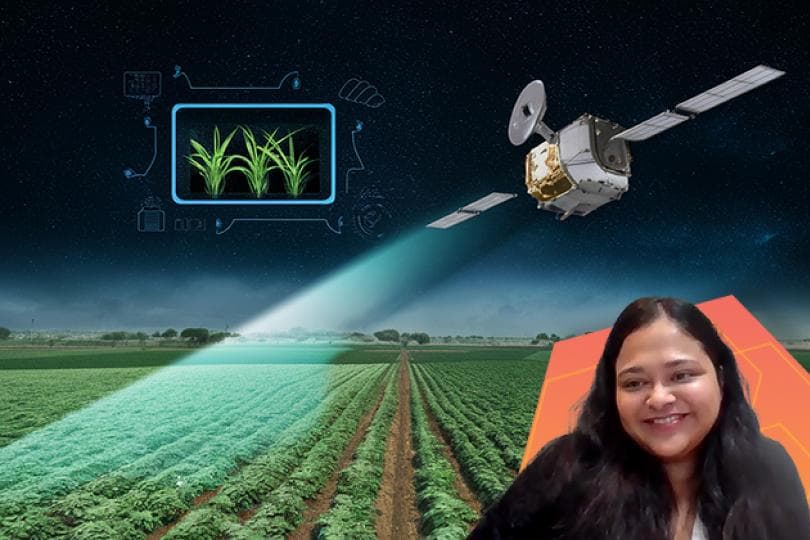Cosmos to Crop
How space tech is posed to revolutionise India’s farming and agriculture sector
Snehal Singh

Examining the dynamics of an agrarian economy like India, many concerns come to light, spanning from soil conditions and water scarcity to the impact of extreme weather events. These issues impact farmers and bear heavily on the nation's overall food security. With its transformative potential, space technology stands poised to revolutionise India's agricultural sector by facilitating precision farming and comprehensive crop monitoring by deploying satellites and other advanced space-based systems. This wealth of data promises invaluable insights for farmers, leading to enhanced crop yields and cost reduction.
Space-based technology can play a pivotal role in safeguarding crops and managing irrigation systems to alleviate water scarcity. Remote sensing satellites, in particular, provide indispensable information on soil conditions, snow coverage, and drought-prone areas, enabling farmers to make informed decisions. By harnessing the accuracy of this data, we can effectively tackle the challenges at hand. Thus, integrating space technology into agriculture will yield positive outcomes for India's farming landscape.
The global space agriculture market will be worth $11.51 billion by 2032, up from $4.99 billion in 2023. These technologies, utilised for smart irrigation, seed positioning, and plant protection, have driven China’s mechanisation rate of crop cultivation to over 70%. Although China holds the largest market share, the sector is growing faster in India than anywhere else in the Asia-Pacific region.
This growth can be attributed to India’s substantial investments in space programs and platforms, supported by both the public sector and an increasing number of private companies. By actively expanding its presence in this field, India is positioning itself to capture a significant share of the market.
The Indian government has launched various programs to harness space technology in agriculture, with many of these initiatives now integrated under the National Program for Space-based Agriculture (NPSDA).
Transforming Indian Agriculture with Space Tech
In the realm of space technology, significant strides have been made in various aspects of agriculture, including crop production forecasting, soil resource mapping, horticulture assessment, drought assessment, crop insurance, and digitisation. These efforts, primarily driven by the utilisation of remote sensing data, hold immense potential to revolutionise agriculture and position India on the global stage.
The emergence of organisations like the Indian National Space Promotion and Authorization Centre (InSpace), an autonomous agency under the Department of Space, exemplifies India's intensified focus on revolutionising agriculture through space technology. InSpace plays a crucial role in promoting the use of space technology for precise monitoring and management of agricultural activities.
InSpace, recognising the importance of fostering innovation in this field, plans to support startups in India by providing financial aid. This proactive approach not only encourages entrepreneurship but also ensures that promising startups focusing on space technologies in agriculture receive the necessary support to thrive. By funding such startups, InSpace aims to enable them to develop and demonstrate their ideas effectively, eventually paving the way for them to secure loans from financial institutions in the future.
Additionally, this technology plays a crucial role in helping Indian farmers become more resilient in the face of erratic weather patterns and other climate-related challenges. By providing insights into soil health and precipitation levels, farmers can better anticipate and mitigate the effects of adverse weather conditions. This enables them to make informed decisions regarding planting, cultivation, harvesting, and irrigation timings, ultimately contributing to the sustainability of their crops. With structured access to this information, farmers can optimise their agricultural practices and enhance their resilience to climate change impacts.
From an agro-economist standpoint, structured crop protection strategies become paramount for farming. Armed with insights from space technologies, farmers can anticipate weather events like intense rainfall or droughts and plan accordingly. By receiving critical information in advance, farmers can make informed decisions to safeguard both their economic well-being and the health of their crops. In the long run, these space technologies serve as a valuable resource, continually providing farmers with the necessary information to adapt and thrive in a dynamic agricultural environment.
By facilitating financial support and encouraging the growth of startups in the agricultural technology sector, initiatives like those proposed by InSpace have the potential to unlock new avenues of innovation and drive sustainable progress in Indian agriculture.
AI Innovation in Space Agriculture
Artificial intelligence (AI) is a key component of space agriculture, enabling precise forecasting of crop yields and optimising resource allocation. Indian startups and institutions are actively integrating AI into space agriculture to empower farmers with advanced capabilities. AI-powered technologies provide farmers with insights into crop health, enabling them to optimise irrigation practices and tailor crop spraying procedures with pesticides or herbicides. These AI-enabled solutions empower farmers to make informed decisions, leading to improved productivity and sustainability in agriculture.
Initiatives like the Saagu Baagu in Telangana, which is a farmer-first approach, exemplify the significant role that startups and institutions play in integrating AI into agriculture. The State government and the World Economic Forum (WEF) jointly invited proposals from startups, Farm Producers Organisations (FPOs), industries, academia, and civil society to showcase end-to-end value chain transformation using new-age technologies under this project.
This collaborative effort between the state government, agricultural organisations, and technology companies aimed to assist thousands of farmers by introducing AI-powered solutions to address traditional challenges in farming. One notable aspect of this initiative was the introduction of a WhatsApp chatbot developed in collaboration with Digital Green and Glyphic. This chatbot provided tailored cultivation methods and answered important queries posed by farmers in their local language. This approach proved particularly beneficial given the diverse linguistic landscape of India, where language barriers often hinder communication and knowledge dissemination in agriculture.
By introducing AI-powered solutions at a grassroots level and ensuring accessibility to farmers across different regions and linguistic backgrounds, initiatives like Saagu Baagu are instrumental in democratising technology and empowering farmers with the tools and knowledge needed to enhance agricultural productivity and sustainability.
Krishitantra and AgNext are other notable examples of agrotech startups leveraging AI to address key challenges in Indian agriculture. Krishitantra focuses on soil health, crucial for successful farming, by establishing local soil testing centres equipped with machine learning technology. This innovation streamlines the soil testing process, providing farmers with timely and accurate insights into soil conditions. Similarly, AgNext utilises computer vision systems to assess field quality, identifying defects in crops based on parameters like colour, shape, and size. This technology not only enhances the value of crops but also helps reduce waste, contributing to improved efficiency and sustainability in agriculture.
Additionally, the collaboration between the International Crops Research Institute for the Semi-Arid Tropics (ICRISAT) and Microsoft in Andhra Pradesh, which introduced a text-driven AI platform, highlights the integration of AI into agriculture. The agricultural technology landscape is rapidly evolving, with numerous financing schemes and funding opportunities emerging for startups in this sector. This partnership exemplifies the growing interest and investment in agricultural technology from both domestic and international companies.
One of the most advanced intelligence providers is the Bengaluru-based Cropin. Cropin stands out as a prime example of the transformative potential of AI-based intelligence in agriculture. Since its inception in 2010, Cropin has made significant strides in assisting smallholder farmers to improve productivity, enhance yields, and uplift their livelihoods. With backing from prominent entities like Google and the Gates Foundation, as well as forging partnerships with companies like Amazon, Cropin has demonstrated its commitment to driving positive change in the agricultural sector.
The scope of Cropin’s impact is impressive; it has partnered with over 250+ organisations globally to digitise over 16 million acres of farmland and enriched the lives of nearly 7 million farmers while building intelligence for over 500 crops and over 10,000 crop varieties in over 103 countries. The solutions offered by Cropin are crop and geo-location agnostic and are available in a plug-and-play model.
Initiatives like Cropin and Fyllo are not only revolutionising agriculture in India but also putting Indian agritech on the global map through strategic partnerships and expansions. Fyllo’s partnership with TerraView, a Spain-based global climate software firm, is a significant step towards leveraging international expertise and resources to enhance precision agriculture practices. By entering into this strategic partnership, Fyllo became the first Indian agritech company to expand globally. This collaboration introduces smart agriculture processes in countries like Italy, France, and Mexico, showcasing India’s capabilities and contributions to the global agricultural landscape.
Way Forward
India's ambitious transformation of its agricultural landscape through the integration of advanced technology signifies a groundbreaking shift towards sustainable and efficient farming. By leveraging government initiatives, regulatory reforms, and the privatisation of space technology, India is ensuring that small-scale farmers gain access to cutting-edge tools and resources that were once beyond their reach.
A cornerstone of this transformation is the National Program for Space-based Agriculture (NPSDA), reflecting the government’s commitment to utilise space technology to enhance agricultural productivity. State-driven projects such as the Kisan drone initiative epitomise this effort, employing drones for critical tasks like crop health assessment, precision irrigation management, and targeted pesticide application. These technological advancements are complemented by the digitisation of land records, which streamlines agricultural operations and promotes sustainable farming practices.
To fully realise the potential of these innovations, it is imperative to strengthen financial support mechanisms. Programs like InSpace and various schemes from the Ministry of Finance play a vital role in nurturing agricultural technology startups. Tailored financial schemes designed specifically for companies introducing space-enabled technology could catalyse a revolution in farming practices, offering substantial benefits to government entities, planners, and strategists alike.
India’s multifaceted strategy, underpinned by robust financial backing and cutting-edge technology, is set to transform agriculture, empowering farmers and driving sustainable growth for the future. By continuing to foster innovation and providing targeted support, India can ensure its agricultural sector remains resilient, productive, and at the forefront of global advancements.
